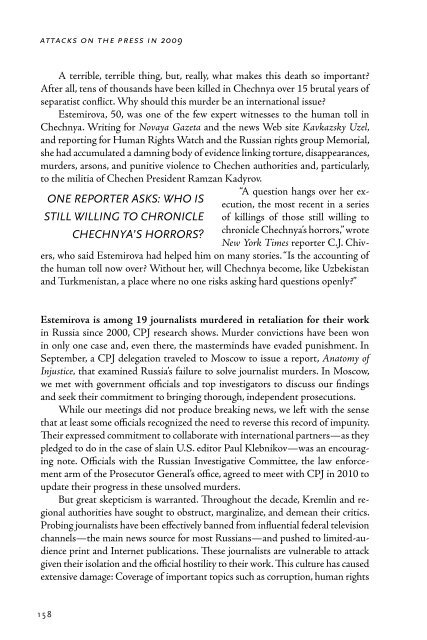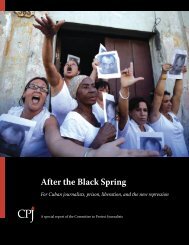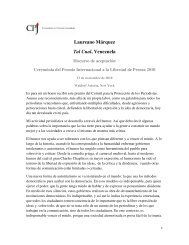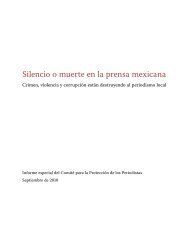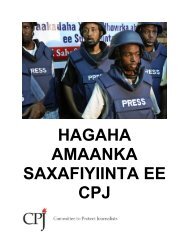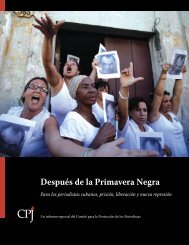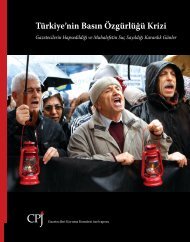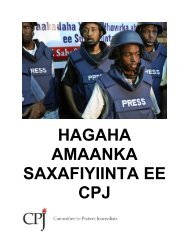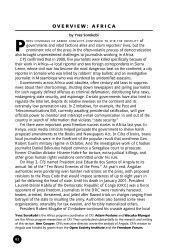Attacks on the Press - Committee to Protect Journalists
Attacks on the Press - Committee to Protect Journalists
Attacks on the Press - Committee to Protect Journalists
- No tags were found...
Create successful ePaper yourself
Turn your PDF publications into a flip-book with our unique Google optimized e-Paper software.
attacks <strong>on</strong> <strong>the</strong> press in 2009europe and central asia: analysisA terrible, terrible thing, but, really, what makes this death so important?After all, tens of thousands have been killed in Chechnya over 15 brutal years ofseparatist c<strong>on</strong>flict. Why should this murder be an internati<strong>on</strong>al issue?Estemirova, 50, was <strong>on</strong>e of <strong>the</strong> few expert witnesses <strong>to</strong> <strong>the</strong> human <strong>to</strong>ll inChechnya. Writing for Novaya Gazeta and <strong>the</strong> news Web site Kavkazsky Uzel,and reporting for Human Rights Watch and <strong>the</strong> Russian rights group Memorial,she had accumulated a damning body of evidence linking <strong>to</strong>rture, disappearances,murders, ars<strong>on</strong>s, and punitive violence <strong>to</strong> Chechen authorities and, particularly,<strong>to</strong> <strong>the</strong> militia of Chechen President Ramzan Kadyrov.One reporter asks: Who isstill willing <strong>to</strong> chr<strong>on</strong>icleChechnya’s horrors?“A questi<strong>on</strong> hangs over her executi<strong>on</strong>,<strong>the</strong> most recent in a seriesof killings of those still willing <strong>to</strong>chr<strong>on</strong>icle Chechnya’s horrors,” wroteNew York Times reporter C.J. Chivers,who said Estemirova had helped him <strong>on</strong> many s<strong>to</strong>ries. “Is <strong>the</strong> accounting of<strong>the</strong> human <strong>to</strong>ll now over? Without her, will Chechnya become, like Uzbekistanand Turkmenistan, a place where no <strong>on</strong>e risks asking hard questi<strong>on</strong>s openly?”Estemirova is am<strong>on</strong>g 19 journalists murdered in retaliati<strong>on</strong> for <strong>the</strong>ir workin Russia since 2000, CPJ research shows. Murder c<strong>on</strong>victi<strong>on</strong>s have been w<strong>on</strong>in <strong>on</strong>ly <strong>on</strong>e case and, even <strong>the</strong>re, <strong>the</strong> masterminds have evaded punishment. InSeptember, a CPJ delegati<strong>on</strong> traveled <strong>to</strong> Moscow <strong>to</strong> issue a report, Ana<strong>to</strong>my ofInjustice, that examined Russia’s failure <strong>to</strong> solve journalist murders. In Moscow,we met with government officials and <strong>to</strong>p investiga<strong>to</strong>rs <strong>to</strong> discuss our findingsand seek <strong>the</strong>ir commitment <strong>to</strong> bringing thorough, independent prosecuti<strong>on</strong>s.While our meetings did not produce breaking news, we left with <strong>the</strong> sensethat at least some officials recognized <strong>the</strong> need <strong>to</strong> reverse this record of impunity.Their expressed commitment <strong>to</strong> collaborate with internati<strong>on</strong>al partners—as <strong>the</strong>ypledged <strong>to</strong> do in <strong>the</strong> case of slain U.S. edi<strong>to</strong>r Paul Klebnikov—was an encouragingnote. Officials with <strong>the</strong> Russian Investigative <strong>Committee</strong>, <strong>the</strong> law enforcementarm of <strong>the</strong> Prosecu<strong>to</strong>r General’s office, agreed <strong>to</strong> meet with CPJ in 2010 <strong>to</strong>update <strong>the</strong>ir progress in <strong>the</strong>se unsolved murders.But great skepticism is warranted. Throughout <strong>the</strong> decade, Kremlin and regi<strong>on</strong>alauthorities have sought <strong>to</strong> obstruct, marginalize, and demean <strong>the</strong>ir critics.Probing journalists have been effectively banned from influential federal televisi<strong>on</strong>channels—<strong>the</strong> main news source for most Russians—and pushed <strong>to</strong> limited-audienceprint and Internet publicati<strong>on</strong>s. These journalists are vulnerable <strong>to</strong> attackgiven <strong>the</strong>ir isolati<strong>on</strong> and <strong>the</strong> official hostility <strong>to</strong> <strong>the</strong>ir work. This culture has causedextensive damage: Coverage of important <strong>to</strong>pics such as corrupti<strong>on</strong>, human rightsabuses, and organized crime goes largely unnoticed by <strong>the</strong> public. Impunity in attacks<strong>on</strong> journalists induces fur<strong>the</strong>r self-censorship am<strong>on</strong>g colleagues.CPJ research has shown that justice has been thwarted by systemic shortcomingsat every level—political, investigative, prosecu<strong>to</strong>rial, and judicial. Investigati<strong>on</strong>sof <strong>the</strong> murders of journalists have been c<strong>on</strong>sistently opaque, oftencompromised by internal c<strong>on</strong>flicts of interest, and frequently subjected <strong>to</strong> unduepolitical influence. Take <strong>the</strong> case of Maksim Maksimov, a St. Petersburg reporterwho was investigating corrupti<strong>on</strong> in <strong>the</strong> local Interior Ministry when he disappearedin June 2004. In <strong>the</strong> hands of <strong>the</strong> same local authorities Maksimov hadbeen examining, <strong>the</strong> murder probe went nowhere. Investiga<strong>to</strong>rs made no evidenteffort <strong>to</strong> follow up <strong>on</strong> allegati<strong>on</strong>s that local officers <strong>the</strong>mselves were involved inMaksimov’s disappearance.Time and again, CPJ research shows, investiga<strong>to</strong>rs failed <strong>to</strong> pursue workrelatedmotives. In <strong>the</strong> few cases that reached <strong>the</strong> courts, prosecu<strong>to</strong>rs broughtweak or even bogus cases <strong>to</strong> trial. In <strong>the</strong> corrupti<strong>on</strong>-ridden city of Togliatti, forinstance, investiga<strong>to</strong>rs ignoredjournalism-relatedmotives in <strong>the</strong> killings ofValery Ivanov and AlekseiSidorov, c<strong>on</strong>secutiveInvestigati<strong>on</strong>s are compromisedby c<strong>on</strong>flicts of interest andpolitical influence.edi<strong>to</strong>rs of <strong>the</strong> muckraking newspaper Tolyattinskoye Obozreniye. After coercing ac<strong>on</strong>fessi<strong>on</strong>, prosecu<strong>to</strong>rs tried an innocent man in <strong>the</strong> murder of Sidorov. The manwas acquitted, and <strong>the</strong> case is unsolved.At times, important evidence has been lost or c<strong>on</strong>cealed. Novaya Gazeta edi<strong>to</strong>rYuri Shchekochikhin died in 2003 from a rare derma<strong>to</strong>logical c<strong>on</strong>diti<strong>on</strong> thatstruck as he was investigating a high-level corrupti<strong>on</strong> scheme. Officials at <strong>the</strong>government-run clinic where <strong>the</strong> journalist had been treated sealed <strong>the</strong> medicalrecords, calling <strong>the</strong>m a state secret. The records, eventually given <strong>to</strong> a Moscowprosecu<strong>to</strong>r, <strong>the</strong>n vanished.A his<strong>to</strong>rian by educati<strong>on</strong> and a Chechen-Russian by descent, Estemirovapossessed <strong>the</strong> intellectual rigor <strong>to</strong> methodically document facts and <strong>the</strong> innatedrive <strong>to</strong> fight injustice. Living under a regime that represses women, she woreheels and red lipstick and looked men straight in <strong>the</strong> eye. In a profile publishedthree days after her death, The Times’ Chivers described <strong>the</strong> importance of herwork: “To <strong>the</strong> families whose pain she worked <strong>to</strong> relieve and whose s<strong>to</strong>ries sheforced <strong>the</strong> world <strong>to</strong> see, she was a resolute champi<strong>on</strong>. To <strong>the</strong> men whose crimesshe exposed, case by case, with a quiet composure, she was a c<strong>on</strong>founding enemy,a feminine nemesis <strong>the</strong>y could nei<strong>the</strong>r fathom nor dissuade.”158159


